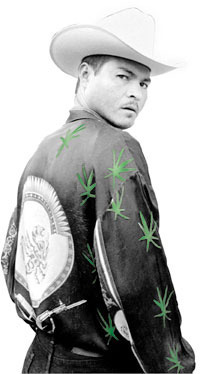 |
 |
 |
 Entertainment | August 2007 Entertainment | August 2007  
Country Radio Looks to Hispanics
 Cindy Watts - Tennessean.com Cindy Watts - Tennessean.com
go to original


| | Broadcast group study says stations can gain listeners by just reaching out. |
Country radio may be missing out on a financial windfall by neglecting America's fast-growing Hispanic population, suggests a recent survey funded by Country Radio Broadcasters.

Hispanic Americans are just as likely to tune in to one of country music's 2,048 radio stations as non-Hispanic Americans if they know they are welcome listeners, according to the survey conducted by Edison Media Research. Larry Rosin, president of the research group, will present its results Wednesday at Belmont University.

"The study showed that the Hispanic population was much more amenable to country music and country radio than anyone suspected before the study," he said. "Hispanics told us they were not in any way opposed to country music, but that they were just less exposed to it."

Edison conducted one-on-one interviews with an undisclosed number of Hispanics in Houston and Miami in December 2006 and did a national telephone survey of Hispanics age 12-49 in all 50 states in January 2007.

Station changes format

Country Radio Broadcasters decided to finance the study after KZLA, Los Angeles' only country radio station, announced it was changing formats to Rhythmic Adult Contemporary because station owners thought the genre was more appealing to its listeners in the heavily Hispanic area.

Ed Salamon, executive director at CRB, said the decision was cause for concern if other station owners around the country followed the same rationale. A decline in country radio stations could foster a decline in country music, which might hurt Nashville, where country is big business.

"As radio — which is the primary platform for country music, country songs and country artists — grows, so do the opportunities for those involved in the country music industry, " he said.

The study revealed 24 percent of Hispanics in America already listen to country music and 40 percent don't but are open to it. Because of this, Rosin said, country stations should see the Hispanic community as a large area of opportunity. The Census Bureau estimated the nationwide Hispanic population to be 41.3 million in 2004 and Nashville was home to 578,698 Hispanics in 2005.

Taking the census data and survey results into consideration, about 10 million Hispanic Americans already listen to country radio and an additional 16.5 million are possibly waiting for an invitation to tune in.

"The survey showed the biggest reason they don't listen to country music more was that they feel they've never been invited to the party," he said. "They've never been asked to listen to country music, and part of their culture is expectation of invitation. What that meant was we don't need to change what we do on air, but engage in outreach to the community."

Philip Kelley, 30, whose mother Lesly was born in Guadalajara, Mexico, said he knows not all Hispanic Americans listen to country music, but he knows his mother is fond of at least one hat-wearing singer.

"You don't see a lot of Mexicans at Tootsies. They're all hanging out at the little Mexican discos, but my mom loves George Strait," Kelly said of his mother, who lived in Mexico for 24 years before immigrating to the United States.

"She thinks he looks good in jeans and she will tell you that. But when I was a kid country music was way more accessible to everyone. ... Now you have to go downtown to hear country music, and they haven't really tried to market country music to the Mexican community."

Group offers suggestions

The Country Radio Broadcasters, an educational organization, agrees and is encouraging stations to start doing just that. During the presentation, Rosin will offer an assortment of ideas on how to better reach the Hispanic demographic including: marketing in Spanish though Spanish media, having a presence in the Spanish communities' fairs and festivals, direct mail, getting endorsements from high-profile Hispanic opinion leaders, and possibly launching a Spanish-language version of the broadcast on the Internet. The music would stay the same but the presentation would be in Spanish, which Rosin said is a cost-effective solution.

The country genre already has an established relationship with the Hispanic population, with the music of popular Hispanic country music recording artists including Freddy Fender, Raul Malo, Rick Trevino and the Texas Tornados. But even with the ground partially in place, Rosin said, it's unreasonable to expect a shift in numbers over night.

"It's important to be patient," he said. "I think there's this expectation that stations will send out a single direct mail campaign and then watch the Hispanic numbers explode. It's very important for people to know I don't think that will happen. I try and emphasize this is going to take work." | 
 | |
 |



